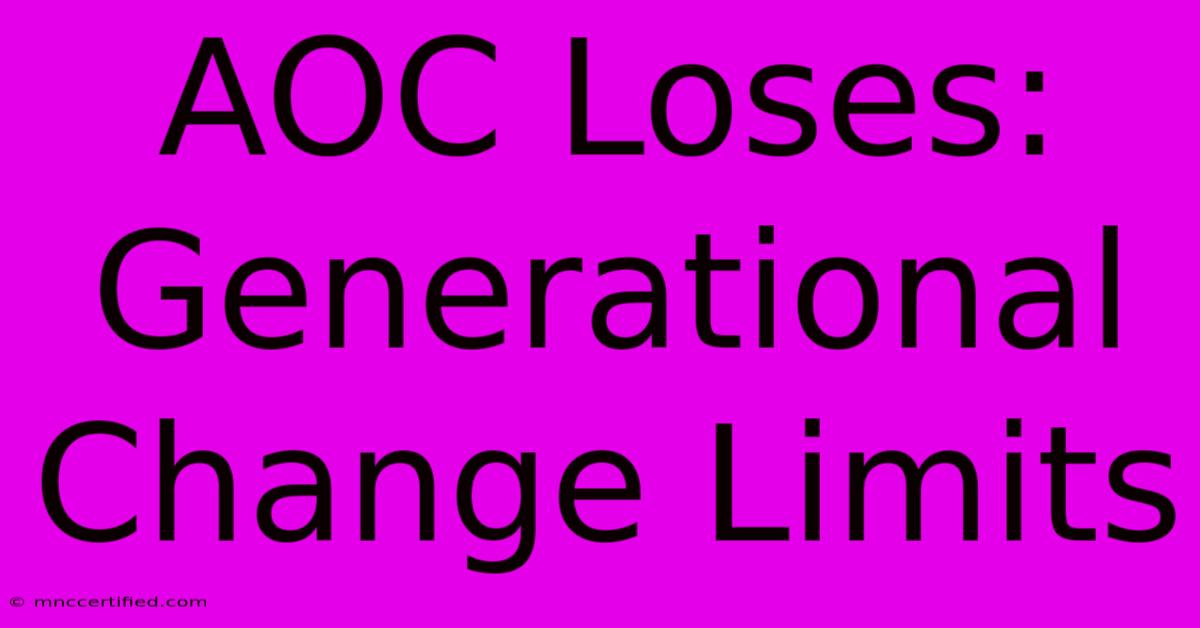AOC Loses: Generational Change Limits

Table of Contents
AOC Loses: Generational Change Limits and the Future of Progressive Politics
Alexandria Ocasio-Cortez, a name synonymous with progressive politics and the millennial generation's political awakening, has faced recent setbacks. While she remains a powerful voice, these challenges highlight the inherent limitations of generational change in deeply entrenched political systems. This article delves into the reasons behind these setbacks, analyzing the complexities of political influence and the future trajectory of progressive ideals.
The Rise and (Partial) Fall of AOC
AOC's meteoric rise was unprecedented. Her 2018 victory, fueled by grassroots support and a powerful message of democratic socialism, captivated the nation. She became a symbol of a new generation ready to challenge the established political order. Her use of social media, her outspoken advocacy for policies like the Green New Deal, and her unwavering commitment to progressive causes resonated deeply with young voters. This grassroots mobilization became a key factor in her initial success.
However, recent political events paint a more nuanced picture. While she continues to hold significant influence within the Democratic party, she hasn't achieved every goal, facing resistance from both within and outside her own party. This highlights the challenges of translating youthful enthusiasm into lasting political power.
Limitations of Generational Change in Politics
AOC's experiences underscore several limitations faced by politicians attempting to drive large-scale generational change:
1. Institutional Resistance:
Established political systems are often resistant to radical change. Deep-rooted power structures, entrenched interests, and established norms create significant hurdles for newcomers, regardless of their popularity or the strength of their message. This institutional inertia acts as a brake on even the most promising progressive agendas.
2. The Limits of Social Media Influence:
While social media played a vital role in AOC's initial ascent, its impact is not limitless. The ability to mobilize voters online doesn't automatically translate into legislative victories. The complexities of lawmaking and the need for compromise and negotiation often require strategies beyond social media reach. Furthermore, online engagement doesn't always equate to real-world political power.
3. The Need for Coalition Building:
Effective political change rarely comes from a single individual or a single generation. Building broad coalitions and finding common ground with diverse groups, including those outside one's immediate base, is crucial for achieving lasting impact. AOC’s struggles emphasize the importance of political alliances and the need to navigate the intricacies of coalition politics.
4. The Reality of Political Compromise:
The legislative process often requires compromise and negotiation, a reality that can be frustrating for those advocating for radical change. While AOC has remained true to her progressive principles, navigating the complexities of compromise within a system designed for incremental change requires significant political skill and strategic maneuvering. This navigational complexity often leads to compromises that may seem insufficient to ardent supporters.
The Future of Progressive Politics: Learning from Setbacks
Despite these setbacks, AOC remains a significant figure in the ongoing conversation about progressive politics. Her challenges highlight the need for progressive movements to develop strategies that address the limitations discussed above. This involves:
- Building stronger, broader coalitions: Engaging with diverse groups and finding common ground beyond a single generation.
- Developing a long-term political strategy: Moving beyond short-term mobilization to develop sustainable strategies for influencing long-term political change.
- Understanding the complexities of institutional politics: Learning how to navigate the legislative process and work effectively within existing systems.
- Leveraging technology strategically: Using social media and other technologies to complement, not replace, traditional political engagement.
AOC's journey serves as a valuable case study for understanding the complexities of political change. Her experiences underscore the importance of realistic expectations, strategic coalition building, and a long-term vision for achieving meaningful progressive reform. The fight for progressive ideals continues, and learning from both successes and setbacks is critical to its ongoing evolution.

Thank you for visiting our website wich cover about AOC Loses: Generational Change Limits. We hope the information provided has been useful to you. Feel free to contact us if you have any questions or need further assistance. See you next time and dont miss to bookmark.
Featured Posts
-
Diane Delano 67 Northern Exposure Actress Passes Away
Dec 18, 2024
-
Boxing Match Mc Gregor Vs Paul
Dec 18, 2024
-
Sara Sharifs Parents Sentenced To Life
Dec 18, 2024
-
Karate Kid Legends Jaden Smiths Role
Dec 18, 2024
-
Was Caleb Williams Dad Right On Bears
Dec 18, 2024